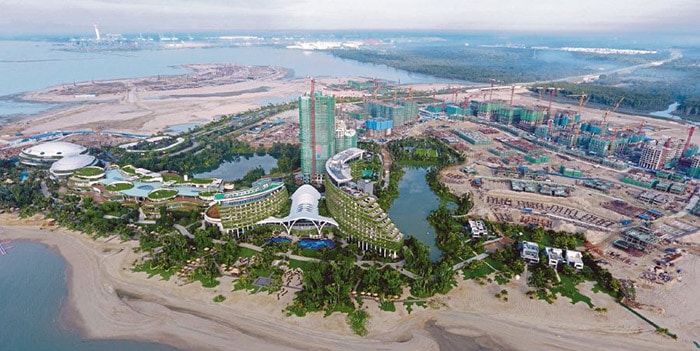
Country Garden’s Forest City runs aground as Dr M steps in
Country Garden’s massive 14-square-kilometre, $100 billion Forest City (森林城市) project in Johor, Malaysia may not be completed as planned following comments by Malaysian Prime Minister Mahathir Mohamad suggesting that foreigners will not be permitted to live in the new city. The property is heavily marketed in China, with Malaysians buying very few of the units sold so far.
“One thing is certain, that city that is going to be built cannot be sold to foreigners. We are not going to give visas for people to come and live here,” Reuters quoted Mahathir as saying.
According to local media, developer Country Garden Pacificview said that the comments did not match the prime minister’s previously expressed sentiments and may have been taken out of context. The developer also noted that it has complied with all relevant regulations and that under the law foreigners are allowed to buy land in Malaysia.
Mahathir Focuses on Chinese Projects
Mahathir, the country’s leader from 1981-2003, was critical of Chinese projects in the country before his surprise return to power in 2018 and has continued to take aim at them. He has said that the investments are expensive, unnecessary, bring an influx of immigrants and could endanger the country’s sovereignty. While still on the campaign trail last December, Mahathir said in reference to Country Garden’s project, “I hope Forest City will truly become a forest … Its residents will consist of baboons, monkeys and so on.” The veteran defender of Malaysian honour added that, “We should realise that once we sell land to others, we no longer have any ownership over it.
After his victory, Mahathir took action, cancelling the $20 billion East Coast Rail Link, a pipeline in Sabah and a high-speed rail that was to run from Singapore to Kuala Lumpur and include a stop at Forest City.
His recent comments about Forest City were made during a press conference on Monday. On Tuesday, the share price of Country Garden, which trades in Hong Kong, declined about 3.79 percent. While Forest City is the company’s largest project outside of China, it represents a small percentage of its overall balance sheet.
Troubled Complex Hits a Political Wall
Forest City has faced a wide range of other problems. China’s crackdown on the outflow of funds for overseas property investments has meant that many buyers have been unable to complete their purchases and have been fighting to get money already committed returned. The developer had originally said it would give refunds to these buyers, then backtracked saying they would have to pay penalties.
Purchasers have complained that they signed documents in English, which many did not understand, and were prevented from using their own lawyers; they could only take advice from attorneys made available by the seller. Local resistance to Forest City is also evident. With an estimate 60 Chinese projects in the area, property values in Johor are eroding and the environment is being stressed. Forest City has already been scaled back considerably from its original 20-square-kilometer design as a result of complaints.
Above Market Units May Have Been Given Away

Mahathir questions the benefits of Chinese projects
Forest City is being built on four man-made islands near Singapore and will be rolled out over a 30-year period. Phase 1 is 369 hectares (911 acres) in size, Phase 2 767 hectares, Phase 3 164 hectares and Phase 4 69 hectares. The site has received duty-free status and a number of government incentives.
By the end of 2017, the company had sold 17,000 apartments of about 20,000 introduced to the market. The units ranged from 500 square feet (47 square metres) to 6,000 square feet and went for an average of MYR 1,200 ($293) per square foot, about the same as higher-end flats in Kuala Lumpur and twice the going rate for space outside the southeast Asian nation’s capital.
The premium that buyers were willing to pay for Forest City units was due in part to the perceived immigration benefits of owning a home in the complex. About 75 percent of those apartments went to people from China and 15 percent to those from other countries excluding Malaysia and Singapore.
As questions have been raised about the value of ownership in Forest Garden, and with competition increasing in the area, signs of trouble have been noted. Heavy discounts have been offered for cash payments, and the Asia Times reported in May that Country Garden may have been giving away Forest City flats to purchasers of high-end apartments in Shanghai.
The developer is 60 percent owned by Guangdong-based Country Garden and 40 percent by Esplanade Danga 88, which is itself owned by Kumpulan Prasarana Rakyat Johor (KPRJ), a State Government of Johor company. The exact shareholding has been a matter of some debate. In Malaysia, Country Garden also has the Diamond City project in Selangor State near Kuala Lumpur.
Leave a Reply